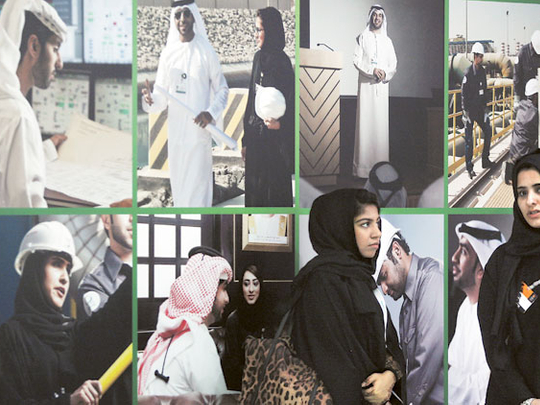
Dubai: The face of the Emirati workforce is undergoing a sea change with women stepping up to the plate and holding senior positions.
This is not only due to governmental, parental and domestic support, but also because private companies are becoming more inclined to hiring women graduates as opposed to men.
Dr Maitha Al Shamsi, Minister of State and Chairwoman of the Marriage Fund, was recently quoted by UAE's official news agency, WAM, as saying that Emirati women have become a significant contributing factor towards the nation's growth and development.
Dr Maitha said women now account for 66 per cent of the government workforce, with 30 per cent in senior positions and involved in decision-making. hFifteen per cent are in technical jobs, medicine, nursing and pharmacy, while another 15 per cent are in the Armed Forces, customs and police.
She said approximately 12,000 businesswomen are running 11,000 investment projects worth Dh12.5 billion. Women now account for 37.5 per cent of the workforce in banks.
As Emirati women become more likely to hold senior management positions, as opposed to their male counterparts, sociologists offer an insight into an evolving society of equals, where women are making significant contributions towards the work force.
Dr Rima Sabban, a sociologist at Zayed University, said from the 1970s to 80s, women's participation in the workforce was very small and due to factors like culture and tradition, they were not readily accepted in the public sphere. The majority of women who were graduates chose not to work but to stay at home.
“The biggest boost came after the launch of the Higher Colleges of Technology, which put women's careers on the fast track. Then came all the other institutions and by the 1990s, there was a major shift and the government also started supporting women,” Rima said.
According to a 2010 PricewaterhouseCoopers report, women form 77 per cent of students in higher education, the highest proportion in the world.
The government helped pave the way for women's empowerment by focusing on education. That in turn helped break certain age-old social taboos that prevented women from being accepted in the work force. In addition, there were economic, social and political factors that contributed to their success.
“Even though there is some discrimination [against women], the private sector mostly prefers younger women who work harder and are paid less. [However] The percentage of participation drops as women grow older and having a female employee above the age of 35 is almost non-existent, unless they are holders of doctorate degrees,” said Rima.
Another factor going for women is the strong domestic support. “Their achievements would not have been on such a grand scale if women did not have adequate domestic support,” she said.
While women are gaining prominence in senior positions, it does not lead to any conflict with Emirati men, even when the latter are required to take instructions from women.
“I think everyone here appreciates a competent leader, regardless of gender. Most Emirati men have had wonderfully strong, loyal and committed mothers. So they appreciate and respect honesty and fairness in someone who is their role model,” said Samineh Shaheem, assistant professor of psychology at Middlesex University in Dubai and cross-cultural consultant at the Human Relations Institute (HRI).
“UAE women today are psychologically and socially eager, competent and ready to contribute to their community,” she said.
“Right from the inception of this country, it was our leaders' aims to make sure women are treated and represented fairly. They were encouraged to participate on the social and economic stage. This invitation to take part in the development of the UAE took some time to unfold and put into practice. So what we see today was always the plan for women in the UAE ... and it is only the beginning.”
“After working for more than five years in this kind of environment, I found it ideal, but learnt that some sacrifices need to be made in terms of family time due to lengthy working hours,” said Nahla Fadhlani, 32, a human resource executive.
“It is really rewarding for an individual. For UAE nationals to have the impetus to continue working in the same organisation, the government should introduce some perks so that one gets the same benefits as government employees.”
Alia Abdul Rahman, 37, who holds a doctorate degree in psychology and works in a senior managerial position in a local organisation, says she is satisfied with her job and has no misgivings about her career path.
“I make recommendations to the managers concerned and they choose which decisions to take in the best interest of the company. While the company is dominated by men, there are mostly women in my department. I receive a lot of respect from my co-workers, regardless of their nationality or gender, and feel that I am part of the work culture and am always included in meetings, projects and gatherings.”








